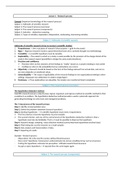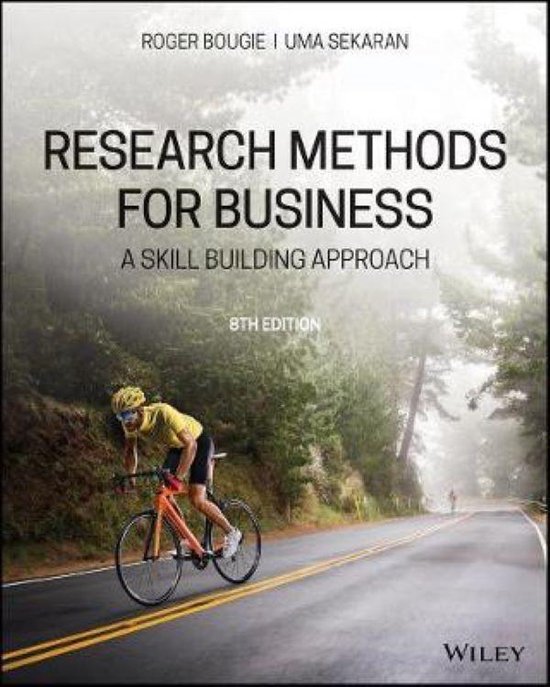Lecture 1 - Research process
Content (important terminology of the research process)
Subject 1: Hallmarks of scientific research
Subject 2: The research process (overview)
Subject 3: The research process (components)
Subject 4: Inductive – deductive reasoning
Subject 5: Types of variables: dependent, independent, moderating, intervening variables
Subject 1: Hallmarks of scientific research
Hallmarks of scientific research (strive to receive in scientific studies)
1. Purposiveness -> aim or purpose of research (clear purpose -> goal for the study)
2. Rigor -> Rigorous research involves a good theoretical base and a carefully thought ‐out methodology.
3. Testability -> A scientific hypothesis must be testable.
4. Replicability -> The extent to which a re‐study is made possible by the provision of the design details of the
study in the research report (possibility to design the same study elsewhere).
5. Precision and confidence
Precision refers to the closeness of the findings to “reality” based on a sample (relating to real world)
Confidence refers to the probability that our estimations are correct.
6. Objectivity -> Research should be based on the facts of the findings derived from actual data, and not on
our own subjective or emotional values.
7. Generalizability -> The scope of applicability of the research findings in one organizational setting to other
settings. (toepassen van uitkomsten in andere omgevingen)
8. Parsimony -> If two explanations are plausible, the simpler one is preferred (least complexity)
Subject 2: The research process (overview)
The hypothetico-deductive method
Scientific research pursues a step‐by‐step, logical, organized, and rigorous method (a scientific method) to find
a solution to a problem. The hypothetico‐deductive method provides a useful, systematic approach for
generating knowledge to solve basic and managerial problems.
The 7-step process of the research process
Step 1. Identify a broad problem area.
Step 2. Define the problem statement (research question).
Step 3. Develop hypotheses. -> A scientific hypothesis must meet 2 requirements.
The first criterion is that the hypothesis must be testable.
The second criterion, and one of the central tenets of the hypothetico ‐deductive method, is that a
hypothesis must also be falsifiable. That is, it must be possible to disprove the hypothesis.
Step 4. Research design: sampling / data collection method (survey/interview/experiment/archival data)
Step 5. Pilot testing (try out the research on a small sample).
Step 6. Data analysis and interpretation of data.
Step 7. Reporting of results
Example - Research process
- Observation: NL is the only EU country without flood insurance
- How come? Hypothesis: homeowners underestimate risk and are unwilling to buy such an insurance
- Testing the hypothesis: estimate risk perception / attitude towards flood insurance
- Accept or reject hypothesis -> if rejected then the cycle begins again
Subject 3: The research process (components)
,Components of a research process
The research process has several components.
Component 1: Theory
Theory is a set of interrelated concepts, definitions, and propositions to explain and predict phenomena.
Theory is not the opposite of a fact.
Many ad hoc theories: developed for specific study / based on previous literature
Role of theory in research
- Theory limits the number and type of data we need to collect
- Theory suggests a system in which observations are classified
- Theory can predict what outcomes we should expect
Component 2: Hypothesis
Hypothesis: a tentative, yet testable, statement, which predicts what you expect to find in your empirical data.
Hypotheses are derived from theory on which your conceptual model is based and are often relational.
- Directional hypotheses: if terms such as positive, negative, more than, less than, and like are used.
- Nondirectional hypotheses: those that do postulate a relationship or difference, but offer no indication of
the direction of these relationships or differences.
The hypothetico‐deductive method requires that hypotheses are falsifiable: they must be written in such a way
that other researchers can show them to be false.
Null hypothesis (H0) is a hypothesis set up to be rejected in order to support an alternate hypothesis (HA)
Alternate hypothesis, which is the opposite of the null, is a statement expressing a relationship between
two variables or indicating differences between groups.
Descriptive hypothesis: value of one variable
80% of students pass the QRM course
Relational hypothesis: relationship between 2 variables of one case
Students who spend more time on the QRM course get a higher grade
Component 3: Concept
Concept: "Generally accepted collection of meanings or characteristics associated with certain events, objects,
conditions, situations, and behaviours"
Agreement on the meaning / concept is specific for one study
Good to observe and measure: customer age / supplier characteristics (size, country) / sales
Component 4: Construct
Construct: conceived (by the researcher) specifically for the study or for theory building
Difficult to observe / often built from concepts (underlying construct)
Different variables can have an underlying construct in an analysis
Operational definition
Operational definition: translate construct into something measurable
- Definition expressed in measurable units (be able to count want we want to measure)
- Definition must be so clear that everyone understands the meaning
Construct: Size of the organization
Operational Definition: "number of employees measured in FTE as of December 31, 2021"
Alternative operational definition: "revenue for the year 2021
Subject 4: Inductive vs deductive reasoning
,Inductive vs deductive reasoning
Inductive reasoning: drawing a conclusion based on an observation (see white swans -> swans are white)
Outcome of inductive reasoning is one or more hypotheses (from “specific” to “general”)
Deductive reasoning: conclusion follows from a set of reasons (premises - detectives - based on theory)
We start with a general theory and then narrow it down into specific hypotheses we can test.
From “general” to “specific”
Possibility to combine these in research process (cycles): example 1 and 2
Subject 5: Types of variables
The need for a theoretical framework
After a critical review of literature we are ready to develop a theoretical framework. A theoretical framework is
the foundation of hypothetico‐deductive research as it is the basis of the hypotheses that you will develop.
Theoretical framework represents your beliefs on how certain phenomena (variables/concepts) are related to
each other (model) and explains why you believe that these variables are associated with each other (theory).
Variables
A variable is anything that can take on differing or varying values. We have 4 main types of variables:
1. The dependent variable (also known as the criterion variable).
The dependent variable is the variable of primary interest to the researcher. The researcher’s goal is to
understand and describe the dependent variable, or to explain its variability, or predict it.
2. The independent variable (also known as the predictor/explanatory variable).
It is generally conjectured that an independent variable is one that influences the dependent variable
in either a positive or negative way (variable that explains the dependent variable)
Dependent variables in business economics
- Marketing: customer satisfaction/loyalty/adoption of products
- Accounting: Performance measurement systems / performance related bonus
- Information Systems: use of/satisfaction with IS
- HRM: job satisfaction/turnover/performance
Dependent and independent variables assume cause-and-effect relationships
Whether a variable is dependent or independent is determined by theory a researcher chooses
3. The moderating variable ((pure/quasi) moderation, interaction)
The moderating variable is one that has a strong contingent effect on the independent variable–
dependent variable relationship. That is, the presence of a third variable (the moderating variable)
modifies the original relationship between the independent and the dependent variables.
4. The mediating variable (full or partial mediation)
A mediating variable (or intervening variable) is one that surfaces between the time the independent
variables start operating to influence the dependent variable and the time their impact is felt on it.
It is now easy to see what the differences are among the variables.
- The independent variable helps to explain the variance in the dependent variable;
- The mediating variable surfaces at time T2 as a function of the independent variable, which also helps us to
conceptualize the relationship between the independent and dependent variables;
- The moderating variable has a contingent effect on the relationship between 2 variables.
Moderator (example)
- Influence of Publicity on Sales depends on Corporate reputation
- A pure moderator itself has no influence on the dependent variable
Intervening variable (example)
, The influence of price and loyalty programs on Customer loyalty runs
through Customer satisfaction
Exam question (variable type)
Answer = intervening variable
Examples
Smoking causes asthma -> Women who smoke (or have smoked) are more likely to have asthma than men.
- Dependent: risk of asthma
- Independent: smoking
Gender is… Moderating variable
Bullying in the workplace Too high (or too low) a workload leads to more bullying in the workplace, which
results in absenteeism.
- Dependent: absenteeism
- Independent: workload
Bullying is… Intervening variable
Example exam question
A researcher concludes that when employees work less hours they also experience less work pressure. As a
result of this reduced work pressure, they are less likely to be absent from work. In this study, "work pressure"
is... a. ... the independent variable. b. ... the dependent variable. c. ... the intervening variable. d. ... the
moderating variable.
Lecture 2 - Research design and sampling
Content
Subject 1: design strategies (The 5 design strategies choices that we have to make)
Subject 2: survey research






